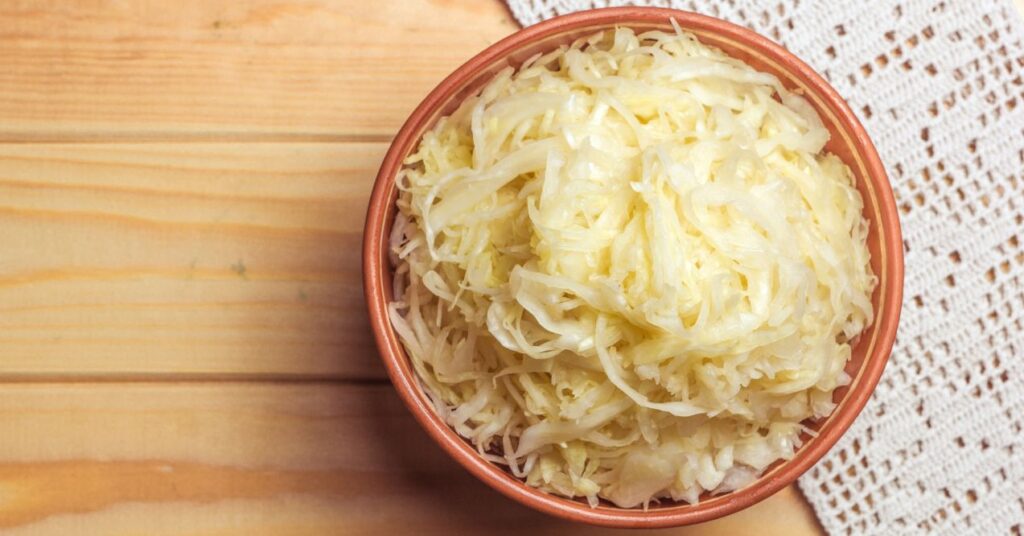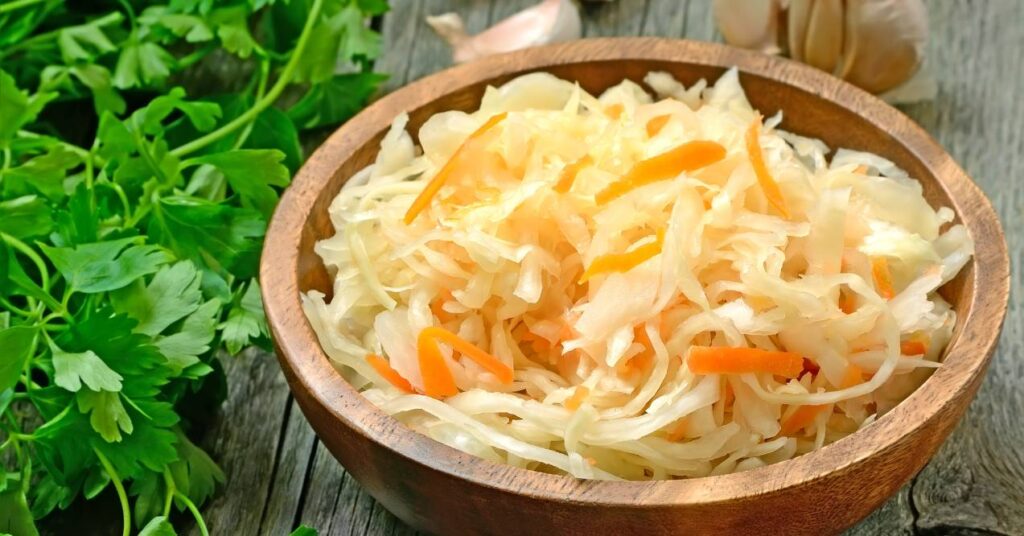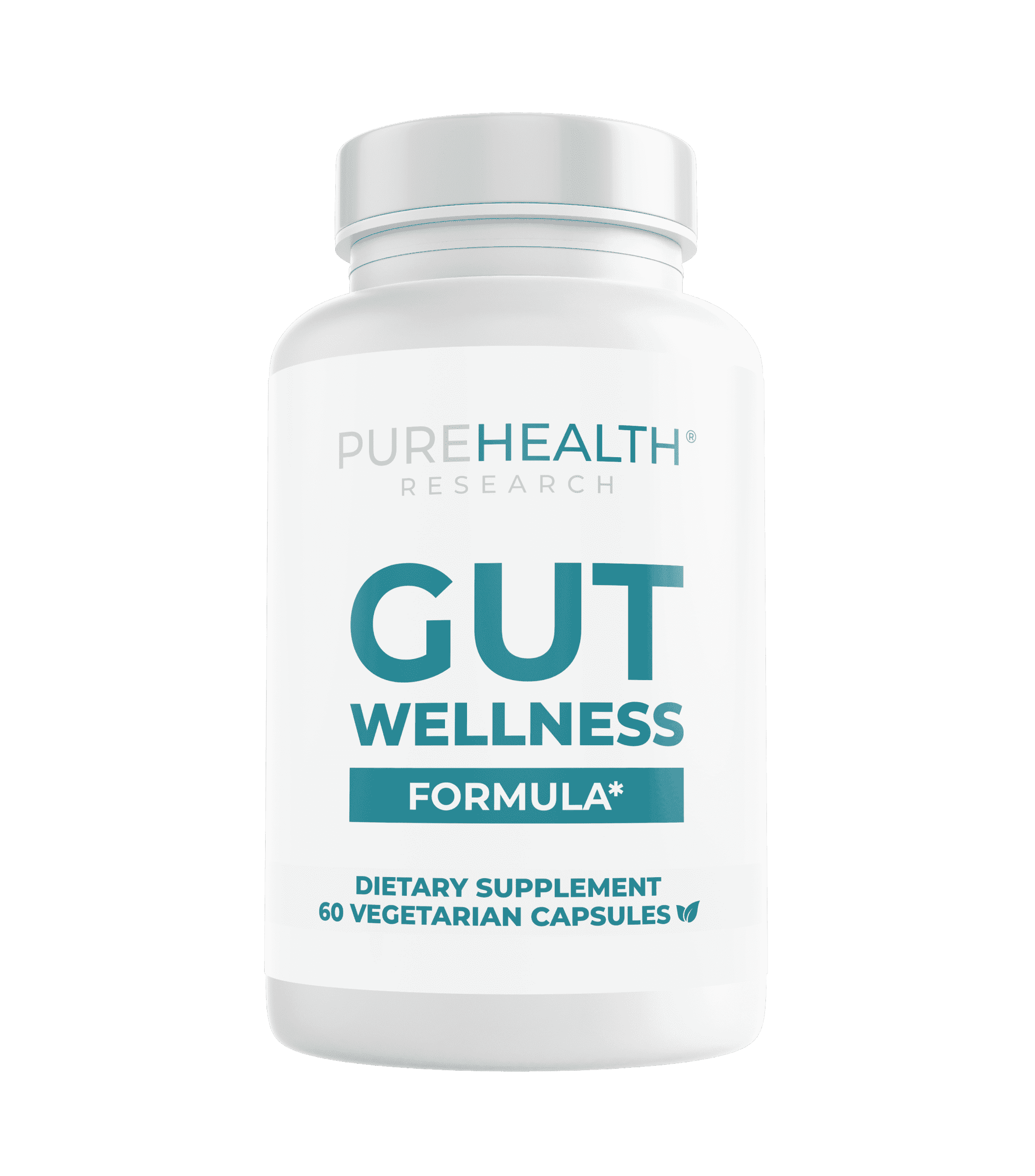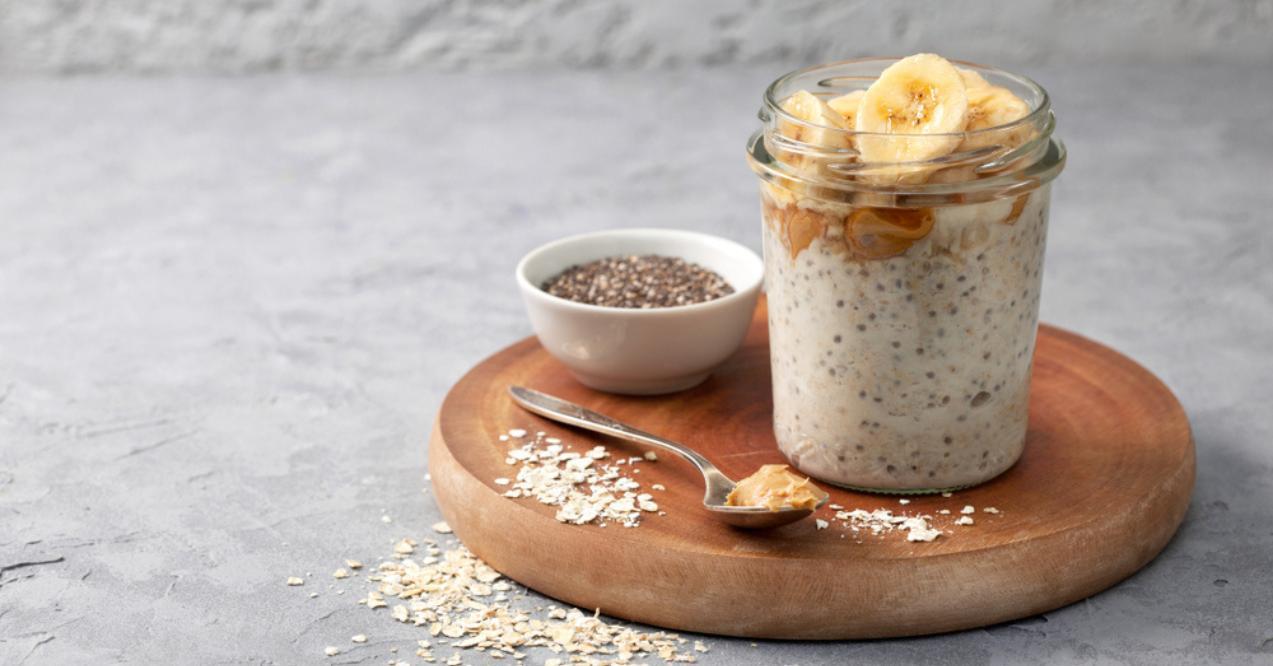Best Time to Eat Sauerkraut for Gut Health
Medically reviewed by our experts


The best time to eat sauerkraut for gut health should be at the top of your consideration. Don’t miss out on the opportunity to consume this unique dish. People in Eastern Europe initially consumed fermented cabbage. However, the popularity of sauerkraut has increased a lot recently due to its probiotic properties.
Consumption of sauerkraut is advantageous for improved digestion. It’s the ideal cabbage meal because of its tart flavor. What is more, if you wonder how does your gut health affects your hormones, the answer lies behind this sour delicacy too. This article explores several aspects of consuming sauerkraut. Read through to learn the best time to eat this delicacy to improve your gut health.
What Is Sauerkraut?
The main ingredient of sauerkraut is shredded cabbage. The outcome of fermenting cabbages creates sauerkraut. You can mix the shredded cabbage with salt to start the process. After 1-4 weeks, you can consume the resulting combination. Its characteristic tangy flavor originates from the fermentation process.
The salt reduces the moisture of the cabbage during fermentation. Therefore, it creates an atmosphere suitable for growth of lactic acid bacteria. The bacteria exist on the cabbage leaf surface. They flourish organically in the salty atmosphere that fermentation creates. The lactic acid gives sauerkraut its taste.
Sauerkraut usage started during the time of the construction of the Great Wall of China. Later, the eastern regions of Europe acquired the skill of producing it. During the winter months, sauerkrauts preserved the cabbage when the fresh produce was scarce. Its popularity rose in European countries before expanding globally. The probiotic properties make it a staple meal for many cultures.
Best Time to Eat Sauerkraut for Gut Health

The best time to eat sauerkraut for gut health is with meals. Sauerkraut helps with digestion by breaking down the meals. It also improves the body’s ability to absorb nutrients. Think of it as an addition to your balanced diet.
Another good time to eat sauerkraut for gut health is as a snack between meals. It works great for people with sensitive stomachs. Consuming it helps you stay full throughout the day, resulting in fewer cravings for less healthful meals. Therefore, it makes for a nutritious snack alternative to incorporate into your diet.
Remember that you gain the advantages brought by consuming sauerkraut in the long run. You have to eat it daily to get all the needed nutrients. Incorporate sauerkraut into your diet to see its nutritiousness fill you in.
What Are the Benefits of Sauerkraut?
The high probiotic content of sauerkraut is one of its top nutritional advantages. Probiotics keep stomach acidity at a controlled level. Therefore, you shouldn’t exclude it from your diet. The following are some advantages of eating sauerkraut:
- Improved Digestion – Do you want to know how to fix a leaky gut? The bacteria found in sauerkraut help to keep the intestines healthy. The bacteria help in breaking down the nutrients. Moreover, it promotes regular bowel motions in your body.
- Reduced Inflammation – Use sauerkraut to help lower your pro-inflammatory activity as the probiotics help in this department. They help lower the risk of developing serious illnesses.
- Enhanced Immune Function – Your immune system has several operations that depend on the gut. The probiotics in sauerkraut strengthen immune functions. It is also a good source of antioxidants. Furthermore, sauerkraut also helps in the development of white blood cells, aiding the body avoid recurring infections.
- Support for Mental Health – Research indicates a tight relationship between the stomach and the brain. Changes in the gut bacteria impact the gut-brain connection. People get more stressed as a result. Consuming sauerkraut balances mood as the probiotics in it benefit the gut-brain axis.
- Weight Management – Sauerkraut reduces your calorie intake. Its few calories make it suitable for people who are dieting or watching their weight. Eating it helps you feel satisfied, as it reduces the likelihood of overeating food. Therefore, it is beneficial in assisting individuals with weight loss.
How Much Sauerkraut to Eat Daily for Gut Health?

The intake of sauerkraut depends on the comfort of an individual. At first, take at least 7 to 10 grams of it each day. That is equivalent to one tablespoon each day. This approach will allow your gastrointestinal system to adjust comfortably as you grow accustomed to its constituents. You can increase to 60 grams or six tablespoons per day as tolerated.
The probiotic content of sauerkraut can vary among different servings. According to studies, one gram of sauerkraut has between one million and one billion CFUs per milliliter. Consequently, you should receive 10 million to 10 billion colony-forming units from a tablespoon serving. As a result, it would be ideal to begin with lower daily dosages and raise them gradually over time. This way, your gut slowly adapts to tolerate higher amounts.
Some individuals may experience digestive discomfort when taking sauerkraut at first. If you experience any adverse reactions, reduce the serving size. Additionally, you can limit how long you eat it until your digestive system adjusts.
How to Incorporate Sauerkraut Into Your Diet?

Your preferences determine how you eat sauerkraut. You can enjoy this timeless option with meat dishes, soups, and sandwiches. Here is a brief guide showing what to eat sauerkraut with.
Sandwiches
In sandwiches, you can introduce a layer of sauerkraut together with beef and cheese. Consuming it in sandwiches adds a tangy and crunchy feeling. Try the combination to improve your gut health.
Soups
In soups, sauerkraut adds flavor. Additionally, it packs a powerful probiotic punch to support digestive health. To produce a tangy soup, mix it with potatoes, onions, and carrots. You may also prepare sauerkraut soup with sausages for extra options.
Meaty Dishes
Looking for the best sauerkraut for gut health? In meaty dishes, it pairs well by adding acidity. Consume it with both white and red meat to maximize its benefits. You may include a tart flavor by baking your favorite pork chops with sauerkraut. You may add it to your beef slices to enhance their flavor.
You can also get creative with sauerkraut by incorporating it in several cuisines. Add it to your takeaway tacos to enjoy the tangy feeling. At home, top your tacos with your sauerkraut along with your favorite fillings to enjoy a healthy gut. You can also add it to your fancy sushi rolls to provide a unique flavor that combines healthy cabbages and seafood.
Experimentation is vital to finding enjoyable ways to consume sauerkraut regularly. Get creative by incorporating it into your morning routine. Get a small bowl of sauerkraut as you sip your best tea for gut health. It can be a versatile combination dish in your diet, leading to improved health. So, get creative and don’t worry about what to eat sauerkraut with during the day.
What if I Don’t Like the Taste of Sauerkraut?
There are several other fermented choices available that serve as best detox for bloated stomach. One of the alternatives is Kimchi. This traditional Korean dish has fermented vegetables seasoned with various spices. Kimchi offers you a spicy and tangy kick. It also provides high fiber and vitamin C that help to reduce pro-inflammatory discomfort.
The other alternative to consider is the dill pickle relish. It has a tangy flavor rich with probiotics. The mixture incorporates cucumbers fermented with dill. Adding it to your daily eating routine increases fiber intake for your gut health. This option also provides beneficial bacteria to enhance your gastrointestinal process.
Another approach to improving your gut health could be trying out the Gut Wellness Formula. This product, which is one of the greatest supplements for cleanse and detox, cleanses toxins from your gut and offers prebiotic and probiotic effects. Pairing it with fermented foods optimizes digestive health.
Improve Your Gut Health With Gut Wellness Formula
Gut Wellness Formula is a natural supplement made to promote gut health. This product’s natural ingredients support gastrointestinal harmony.
The Gut Wellness Formula helps cleanse toxins from the gut while promoting “good” microbiota growth. Its ingredients have unique qualities to improve gut health in an innovative way. This supplement formula offers prebiotic and probiotic properties that fuel beneficial gut bacteria. Adding it to your routine reduces toxins, supports bowel movement, and optimizes nutrient absorption.
What makes the Gut Wellness Formula stand out is its immune-supporting benefits. Pairing it with a healthy diet and lifestyle choices help strengthen proper immune functions and defenses against common ailments. In addition, the supplement has no gluten or dairy, and it can be included in vegan dietary plans.
How Long Does Sauerkraut Last?
You can keep sauerkraut for a long time if stored properly. After opening, your sauerkraut may be stored for four to six months with proper refrigeration.
Rarely, but if it is not stored correctly sauerkrauts can spoil before the expiration date. You will notice a bad sauerkraut from the off-putting smell. You might also see mold growing on the surface of the cabbages. Additionally, there should be indications of color changes and a change in texture when you feel the sauerkraut between your fingers. Throw out the sauerkraut if you observe any of these signs.
The following are some of the variables that impact shelf life:
Storage Conditions
It is necessary to preserve sauerkraut in a dark, cool area. Storing the dish away from direct sunshine might be beneficial. The fermentation process accelerates with an increase in warmth. Store in the refrigerator for best results.
When making sauerkraut at home ensure that the cabbage submerges in the brine. Submerging it fastens the process of fermentation. Additionally, it minimizes the harmful bacteria from growing in the cabbage. Refrigerate the sauerkraut once it has finished fermenting to preserve its flavor.
Packaging
Homemade sauerkraut should be stored in jars made of plastic or glass. Sealing the storage container can prevent spillage. Any leak in the jar can contaminate the quality of the sauerkraut. Make sure the glass jar is clean. Obtain airtight covers as well to extend shelf life.
Store-bought sauerkrauts usually have an expiration date printed on the package. Consuming it before the expiration period is necessary to ensure optimal quality. Make sure to keep the sauerkraut refrigerated after opening to preserve its flavor. The fermentation process slows down considerably thanks to the cold temperatures. Therefore, it supports the sauerkraut’s texture and flavor without spoiling.
Conclusion
Sauerkraut is a powerhouse of probiotics and nutrients that can significantly support gut health, digestion, and overall well-being. By understanding the best time to eat sauerkraut for gut health, you can maximize its benefits – whether incorporating it into meals, enjoying it as a snack, or pairing it with other gut-friendly foods. Regular consumption, starting with small portions and gradually increasing, can help your digestive system adjust and thrive. Prioritizing gut health with fermented foods like sauerkraut can lead to better digestion, a stronger immune system, and overall improved wellness.
You can pair it with tacos, sushi rolls, meaty dishes, sandwiches, salads, and soups or eat it as a snack on its own. The various combinations provide a tangy taste. Use it in burgers to offer a unique flavor.
Yes, it could assist in weight management. The meal has low calories and fat content. Therefore, it is suitable if you want to reduce your weight. The fiber content in sauerkraut also makes you feel full, helping reduce cravings and the consumption of extra food.
Carbohydrates are few in sauerkraut. One hundred grams contains 4.3 g of carbs. However, the amount of carbohydrates will differ based on the fermentation procedure.
Popular Articles
Advertisement. This site offers health, wellness, fitness and nutritional information and is designed for educational purposes only. You should not rely on this information as a substitute for, nor does it replace, professional medical advice, diagnosis, or treatment. If you have any concerns or questions about your health, you should always consult with a physician or other health-care professional. Do not disregard, avoid or delay obtaining medical or health related advice from your health-care professional because of something you may have read on this site. The use of any information provided on this site is solely at your own risk.

















